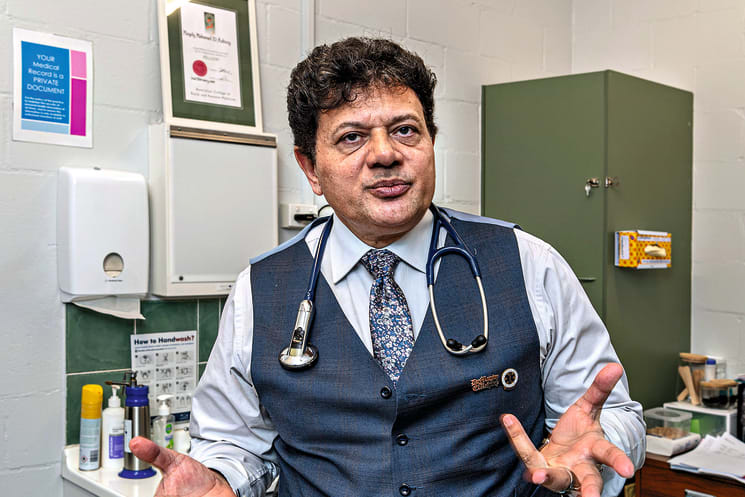
The Working Better for Medicare Review will investigate cases such as Dr Magdy El Ashrey’s in which he cannot recruit doctors after Department of Health boundary changes. Photo: LYLE RADFORD
A RURAL Walloon GP’s fight against bureaucracy that has robbed him of registrar doctor staff has proved key in triggering a wide-reaching Federal review.
Our newspaper group highlighted before Christmas how Queen Street doctor Magdy El Ashrey had watched on in dismay as four of his doctors – from a staff of six – had deserted his practice after a Canberra boundary carve-up.
His headache began when the Modified Monash Model system (MMM) reclassified his once rural-zoned surgery – with a patient list of 15,000 – as a metro zone.
That ill-fated decision meant he was no longer able to tap into a pool of overseas registrar doctors as employees because medical colleges demand they train in rural areas as part of current Distribution Priority Area rulings.
Federal Member for Blair Shayne Neumann read our stories about Mr El Ashrey’s troubles and gave a speech in Federal Parliament.
On the back of Mr Neumann’s address and with a mounting number of doctors facing the similar problems as Dr El Ashrey, Federal Minister Mark Butler announced a review into the shortcomings of the reworked MMM system.
“The Government has undertaken a review to urgently investigate how to more equitably distribute doctors and other health workers around the country,” Mr Butler said.
“The Working Better for Medicare Review will look at how current policies and programs can be strengthened in the outer suburbs of our major cities and in regional, rural and remote Australia.
“The Government will use all possible levers to encourage doctors and other health workers to be where patients need them to be – outside of cities and in areas of need.
“I am delighted that two expert, independent reviewers have accepted my invitation to guide the review and look forward to the outcomes of this important work.”
Mr Neumann said he warmly welcomed the news.
“I’m delighted the Minister has initiated the review, and I hope it can make it easier for practices like the Walloon Medical Centre to recruit more doctors,” Mr Neumann said.
“I see this as a win for the electorate following my advocacy.
“We need to encourage more Australian medical students to train as GPs and we need to promote the rewards of serving the community.”
A Royal Australian College of General Practitioners report found that GPs were seeing more patients than ever and were suffering mental health problems caused by stress.
It showed that general practice sustainability must be addressed to prevent practice closures, with four out of five practice owners concerned about the future of their surgeries.
WHAT SPARKED THE REVIEW?
Under the Modified Monash Model (MMM), the Department of Health and Aged Care assigns categories 1 to 7 to define locations as metropolitan, rural, remote, or very remote.
In 2021, Dr El Ashrey’s Queen Street surgery was rezoned from a rural to metro zone 1 region.
That meant that although the doctor could still employ overseas graduates, he would ultimately lose them to rural areas because that’s where doctors colleges require fellowships be gained under the Distribution Priority Area (DPA) system.
“The zone changes fall at the roundabout, 100m from my practice and that makes no sense as I am in the quieter part of Walloon,” he said.
“The council has just approved a new development at Thagoona for 359 homes, yet that area remains classified as rural.
“I don’t have the fight to deal with the red tape.
“Many of my patients are like family to me; it would be a terrible pity if I have to leave here.”
Walloon Medical Centre attends to the needs of more than 15,000 patients with just two doctors – down from six a few years ago.
A fellow of the Australian College of Rural and Remote Medicine and The Royal Australasian College of Physicians, Dr Ashrey was once tipped as Egypt’s next health minister.





